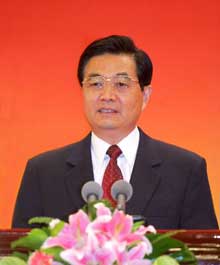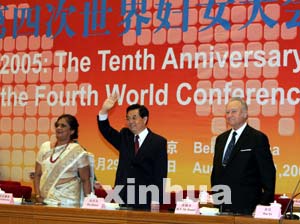| President Hu: Gender equality crucial | ||||
| 2005-08-30 00:00 | ||||
|
Participants at a ceremony commemorating the 10th anniversary of the Fourth World Conference on Women held in Beijing agreed yesterday that greater efforts should be made to achieve gender equality and heightened civilization.
An important milestone in the history of the global women's movement, the Fourth World Conference on Women went a long way towards promoting social justice and social undertakings in countries all over the world, said President Hu Jintao. "The significance of the conference has since been made more and more evident by the advances of women's development cause worldwide," Hu said yesterday at the commemoration, which has attracted roughly 500 people from more than 80 countries. "Women are a great source of strength in creating human civilization," Hu said. "The promotion of gender equality and protection of women's rights impact on the immediate interests of women and decide whether human beings can fully develop their potential and pursue a better life." Hu's remarks were echoed by Khalid Malik, the UN resident co-ordinator in China, who said he believed that gender equality is a key factor in eliminating poverty, improving education and health, and achieving sustainable development. Gender equality is a precondition to overcoming starvation, poverty and epidemics," Malik said.
Ann M. Veneman, executive director of the United Nations Children's Fund, said that educating girls provides both short-term and long-term benefits, "including reduced child mortality, increased productivity and income, better-educated children and gains for women's and girls' social status and empowerment." "Gender-based violence in any of its forms denies girls and women their basic rights and dignity and harms the development of entire countries," Veneman said. Many of the issues raised are still closely related to China, even though achievements have been made in many aspects. Inequality in employment, under-representation in governance and high illiteracy rates among women all still plague the world's most populous country. China has a population of 1.3 billion, with women accounting for about half. Therefore, the promotion of gender equality and the overall development of women is not only of great significance for the country's development but also has a special influence on the efforts for the advancement of mankind, said Gu Xiulian, chairwoman of the All-China Women's Federation. It has always been a basic State policy of China to promote equality between men and women. In recent years, more laws and regulations have been launched to promote gender equality and to ensure that women enjoy equal rights with men in terms of politics, economy, culture, and social and family life, and continuously pushes forward women's development in an all-round way, Gu said. |

